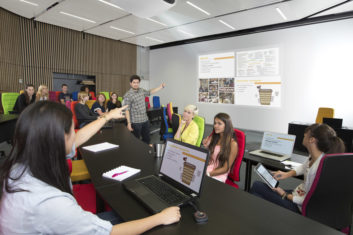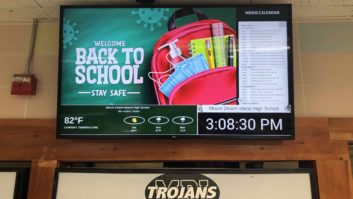Covid-19 has been the “catalyst to a sea change in the use of technology within schools”, kick-starting an “unprecedented level of government investment” in countries as diverse as the US, the UK, Peru and Kazakhstan, according to Futuresource Consulting, which is currently finalising the agenda for its Ed Tech Collaborative 2021 event (*see details below).
Lock downs, distance and hybrid learning have become part of everyday life, says Futuresource, and this has kickstarted the investments as well as accelerating the GIGA project (global initiative to connect every school to the Internet) in Japan, which concentrated five years of planned investment activity into less than 12 months.
 Consequently, according to Futuresource, 2020 saw “unprecedented growth” in mobile PC demand to the K-12 market, with global demand expanding by 69% over 2019 to reach 51 million units. Furthermore, demand increased by 209% year-on-year during calendar Q4, with shipments of 16.5 million units during the closing months of the year.
Consequently, according to Futuresource, 2020 saw “unprecedented growth” in mobile PC demand to the K-12 market, with global demand expanding by 69% over 2019 to reach 51 million units. Furthermore, demand increased by 209% year-on-year during calendar Q4, with shipments of 16.5 million units during the closing months of the year.
2020 also saw a shift in OS share with Chrome capturing global leadership, with a share of 44% over the calendar year driven by strong Chromebook demand in the USA and Japan. Windows held a 32% share of global shipments.
“The year has also been characterised by supply chain issues, both in terms of device assembly capacity and component parts,” said Michael Boreham, senior consultant at Futuresource Consulting. “This, combined with continued ramp up in demand, has resulted in lengthening delivery times and the build-up of a large backlog of orders which extends well into 2021.
“With demand outstripping supply and delivery times elongated, some schools are electing to keep older devices in use much longer to ensure students have access to a device. The whole supply chain has been strained like never before. In addition, the adoption of mobile PC’s has fuelled rapid uptake in G-Suite/Google Classroom and Microsoft 365,” added Boreham.
Additionally, the roll out of devices has also highlighted a number of issues, notably around student connectivity. In the short term this has been resolved by a range of initiatives, such as shipping devices with dongles or mobile hot spots. However, 2021 will begin to see OEM’s roll out LTE based devices for the K-12 market.
Furthermore, the rapid wave of technology adoption highlights a continued requirement for investment in teacher training to best utilise technology in remote learning.
* The agenda for Futuresource’s Ed Tech Collaborative 2021 event is nearing completion, as it confirms an impressive roster of industry experts to its speaker list.
The event, which takes place on 24 and 25 March (1400-1800 GMT), has been created for industry partners to discuss cutting-edge innovations and market forces across the education technology ecosystem, supported by Futuresource’s latest global market and end user research.
The agenda will cover themes such as education’s future outlook post-pandemic, remote learning, security and safeguarding, motivating and engaging students in hybrid learning environments, and esports’s role in the learning process. Confirmed speakers for the event include Jim Gardner, ICT Adviser at the Department of Education; John Solomon, VP and GM Chrome OS, Google; Cigdem Ertem, global director for education and public sector sales at title sponsor Intel; Bob Snyder, Channel Media Europe, and frequent ISE Daily contributor; Carla Aerts, OBE, Learning Refracted; Tom Dore, head of education at the British Esports Association; and many more.
Chris Mcintyre-Brown, associate director at Futuresource Consulting said of the event, “While we’ve missed out on many physical events over the past year, particularly BETT in January, the ability to pivot from in-person to digital provides many benefits. We can effectively combat the hurdles of social distancing and still provide an opportunity to share quality content with a global audience, both live and post event too.”
More information on the agenda, speakers, and registration can be found on Futuresource Consulting’s website.





